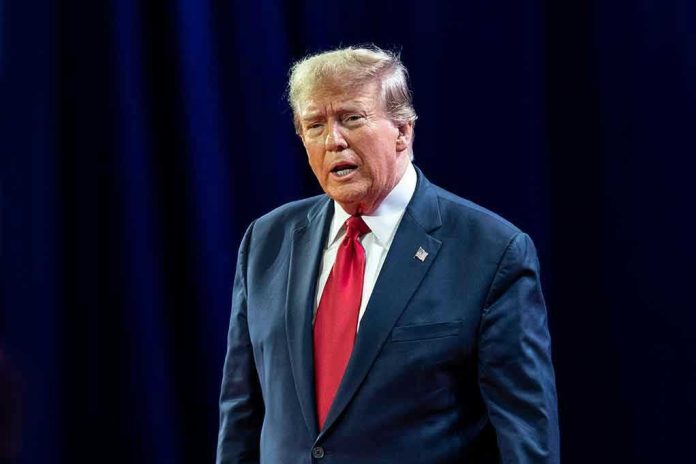
President Trump’s revival of the Roosevelt Corollary marks a dramatic return to aggressive U.S. interventionism in Latin America, raising questions about the future of hemispheric relations.
Story Snapshot
- Trump’s policies echo early 20th-century U.S. interventionism.
- Military actions and sanctions target alleged threats in Latin America.
- China is framed as a strategic rival in the region.
- Regional backlash underscores tensions over U.S. dominance.
U.S. Military Operations in the Caribbean
President Trump intensified U.S. military operations in the Caribbean, targeting drug trafficking networks. These actions signal a significant escalation, reminiscent of historical U.S. interventions justified under the Monroe Doctrine. The first major airstrike occurred on September 2, 2025, against a Venezuelan vessel, resulting in 11 deaths. This move has sparked debates about the U.S. role in the region and its implications for international relations, particularly concerning the perceived threat from China.
The revival of the Roosevelt Corollary as a policy framework underscores a return to American interventionism. The corollary historically justified U.S. interventions in Latin America under the guise of maintaining stability and security. With Trump reviving this approach, the U.S. aims to counter foreign influence, namely China’s growing presence in the region. The administration’s actions have led to increased tensions with Latin American governments, some of which view these measures as violations of their sovereignty.
Historical Context and Precedents
The Monroe Doctrine, established in 1823, declared the Western Hemisphere off-limits to European colonization, setting the stage for American dominance in the region. By 1904, the Roosevelt Corollary expanded this doctrine, asserting the U.S. right to intervene in Latin American affairs. This policy has a storied past, with interventions in Cuba, Nicaragua, Haiti, and the Dominican Republic. Trump’s recent actions echo these precedents, illustrating a strategic shift back to assertive U.S. oversight in the Americas.
The backdrop of the Cold War saw the Monroe Doctrine invoked to counter Soviet influence, while recent years have seen a resurgence of U.S. anxieties about external influences, particularly from China. The Caribbean and northern South America are now focal points for U.S. operations, with Venezuela emerging as a key flashpoint due to its political instability and alleged ties to transnational criminal networks.
Key Stakeholders and Power Dynamics
President Trump and his administration are at the forefront of this policy shift, emphasizing hemispheric security and countering foreign influence. The U.S. military and intelligence agencies are executing operations, targeting criminal organizations, while Latin American governments navigate pressures to align with Washington’s policies. China is perceived as a strategic rival, seeking to expand its economic and diplomatic footprint in the Americas, challenging U.S. dominance.
The power dynamics in the region are complex, with the U.S. wielding significant military and economic influence. However, resistance from some Latin American governments and competition from China complicate the geopolitical landscape. Regional alliances and blocs are divided, with some aligning with U.S. initiatives and others seeking alternative partnerships.
Impact and Consequences
The short-term implications of Trump’s policies include increased violence and instability in targeted regions, along with heightened diplomatic tensions between the U.S. and several Latin American nations. The strained U.S.-China relations are a byproduct of these actions, as the U.S. seeks to contain China’s influence in the hemisphere. Long-term consequences may involve an entrenched U.S. military presence in the Caribbean, potential regional backlash, and a shift in alliances toward other global powers.
Civilian populations in affected regions, particularly in Venezuela and the Caribbean, face humanitarian impacts from military actions and sanctions. The economic, social, and political disruption may lead to erosion of regional norms and increased anti-American sentiment. The defense and security sectors may experience heightened activity, while diplomatic and development sectors face new challenges in engagement and aid delivery.

